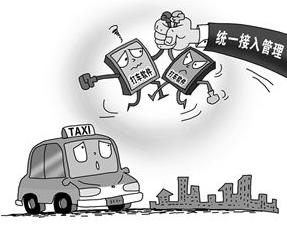
Having just experienced a frenzied subsidy period in the taxi software industry, the relevant authorities announced that they will implement unified management for the taxi call. On May 27, the Ministry of Transport announced on its website the "Circular on the Promotion of the Orderly Development of Taxi Call Services for Mobile Phone Software, etc. (Draft for Soliciting Opinions)." The Opinions pointed out that all local transportation authorities should strengthen the unified access and management of the taxi call service and gradually realize the demand for vehicle calls made through various methods such as manual telephone calls, mobile phone software calls, and network appointments. The unified city taxi taxi call service platform operates and is pushed to the unified vehicle terminal broadcast.
The taxi call service has long existed, but it has become a social hot spot. The main reason is that starting from 2012, some mobile phone taxi drivers have been put into operation. The two "industry giants" headed by taxis and fast taxis rely on the popularity of the mobile Internet and smartphones to enable instant sharing of supply and demand information between passengers and drivers. At the same time, with the help of Internet finance, direct payment of cash to passengers and drivers has achieved a rapid increase in the software installation rate in a matter of months. For a long time, for many urban residents, going out for a taxi and using taxi software has become a "consumer habit."
The combination of technology and capital has rapidly fostered the "consumption habits" of passengers, but it has also brought about a series of problems, such as the "unfair" cabling opportunity and safety hidden troubles caused by drivers robbing passengers. In this context, the opinion draft issued by the Ministry of Transport clearly stated that the unified access management of the taxi call would appear to be a measure that could be considered to cater to public opinion. However, as many analysts are worried about, the ultimate result of the “unified management†of the government will not wipe out this prevailing market competition. Past experience has warned us that government intervention is not conducive to market prosperity.
Although the opinion given to taxi drivers is not readily available, more emphasis is placed on the development of a variety of telefax formats, including artificial telefax, to promote the establishment of differentiated and multi-modal taxi service systems. How to say, to "consolidate management" of existing taxi drivers, one must answer one question: how to effectively manage the government without affecting the market's continued prosperity.
According to the current statement, local governments must operate through a unified city taxi call service platform and push them to the unified vehicle terminal broadcast (the unified vehicle terminal can bind the driver's terminal software and synchronize information). This acquiesced that all taxi software companies must pass the platform set by the government and then compete on the platform set by the government. Before that, taxis and fast taxis each had its own system, which was mainly based on a high-speed device such as a mobile phone. Once the government had to intervene, the terminal platform would be transferred from the mobile phone to a device that has not yet been successfully developed.
Should effective management redesign the terminal platform? The answer is obviously not necessarily. However, the terminal platform of the government organization design (in which the taxi drivers are also invited to join the design team) is lacking the motivation for market competition. Therefore, it is difficult to obtain continuous improvement from experience to update. The government's platform is the product of the "planning," and closure is its greatest feature. Encouraging "competition" on this closed platform and relying on how open the market can play will have a big question mark.
Judging from the current situation, this direction of reform is likely to drag on the back of market-oriented companies. The beneficiaries may only be the government departments responsible for the design and promotion of terminal calls, and the traditional teleportation companies that are closely related to them but are now aging. It is of course not rigorous to follow the motives from the beneficiary to push back the policy. However, there is one point: "Fair imbalances" and other problems caused by fierce competition in the diagnosis and treatment market should not be carried out through restricting competition and restricting technology renewal. Instead, we must help the disadvantaged party on the basis of ensuring sufficient competition. Strategy to achieve. Existing programs do not contribute to the continued prosperity of the market, and are likely to lead to the shrinking of the emerging market area. Therefore, the “unified†actions of the regulatory authorities must be cautious.
The use of administrative measures to solve the problem of taxi calls has proved to be a failure in the past. The unusually popular taxi software in the past two years has substantially filled the "information gap" between passengers and drivers. It has been quite successful. Despite the emergence of new issues, management should not superstition "unified management."
Epp Raw Material,Epp Material,Epp Beads Foam Raw Material,Epp Foam Beads
Taizhou Tianma Plastic Products Co. LTD , https://www.tztmslepp.com